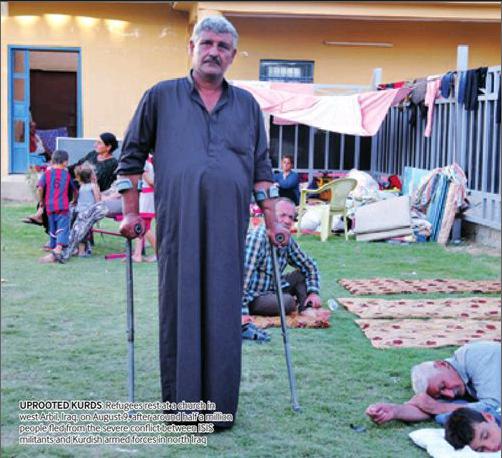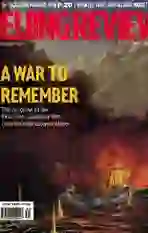The Unopposed Intervention
2014-09-16ByyuLintao
By+yu+Lintao

For the past several months, in the face of the brutality launched by the Islamic State in Iraq and Syria (ISIS) in northern Iraq, which was previously known as the Islamic State of Iraq and the Levant, the“world police” appeared to have been taken off guard. Despite the surprising setback, it is not too late to prevent more humanitarian crises in the war-torn country.
Belated involvement
Iraq has been plagued with violence ever since the U.S.-led occupation of the country, but the situation has deteriorated dramatically recently with the spillover of violence from the raging conflict in neighboring Syria. The al-Qaedalinked ISIS has gained significant ground in Iraq, especially in Sunni areas. The ongoing fighting has displaced more than 500,000 people since June, according to the UN Assistance Mission in Iraq. In total, some 1.4 million have been displaced inside Iraq, including more than 230,000 Syrian refugees, who were also forced to flee.
Given the lessons learned from the justconcluded Iraq war, observers told Beijing Review that the Obama administration is highly reluctant to get involved in the Iraqi conflict once again, though Bagdad repeatedly asked Washington for support.
Tian Wenlin, an associate researcher at China Institutes of Contemporary International Relations, said that as the Obama administration has been moving its focus to the Asia-Pacific, it is less willing to send more troops to the Middle East.
However, the developments taking place in Iraq appear to have been totally unan- ticipated by Washington. ISIS has in recent months swept through the countrys north, beheading victims while seizing territory in a spree of violence, and have vowed to attack the capital city of Baghdad. More recently, ISIS took several parts of Iraqs Kurdish region, forcing hundreds of civilians to flee.
Tian noted that the latest ISIS expansion is not only precipitating serious humanitarian crises in Iraq but also threatening the interests of the United States.
Thousands of U.S. citizens are living or working in Iraqs Kurdish region—an important oil base. U.S. oil giants Exxon Mobil, Chevron and others have large projects there. The United States also has a consulate located in Arbil, capital of Iraqs Kurdish region. ISIS constitutes a severe threat to the security of peoples lives and properties, and President Obama is certain to lose support if his administration fails to offer protection.endprint
In addition, the Kurdish autonomous government in the region is also traditionally proWestern and has a positive relationship with Washington. If the Kurdish region falls into the hands of ISIS, the massive oil revenue will further strengthen the extremist group. Moreover, the United States will lose its influence on and dominance of the whole Middle East if ISIS gains control of Iraq—an unthinkable outcome that would signal the abject failure of the U.S. antiterrorist strategy.
“To some extent, the United States contributed to the rise of ISIS. Washington needs to take responsibility for the situation in Iraq,” Tian told Beijing Review. ISIS emerged fully during the Syrian civil war. To topple the current Syrian authority, the Obama administration acquiesced in allowing for the role of Islamic militants—including ISIS—in the battle against the Syrian army.
Former U.S. Secretary of State Hillary Clinton also admitted that the rise of Islamic militants in both Syria and Iraq has connections with Obamas failed foreign policy. In a recent interview with the U.S. news magazine Atlantic Monthly, Clinton said that “the failure to help build up a credible fighting force of the people who were the originators of the protests against Assad—there were Islamists, there were secularists, there was everything in the middle—the failure to do that left a big vacuum, which the jihadists have now filled.”
Shen Dingli, Associate Dean of the Institute of International Studies with Fudan University in Shanghai, claimed that the Iraq war launched by the former Bush administration is the root of the current chaos and the subsequent hotbed of extremism.
Observers claimed that one of Obamas primary aims in intervening with the current Iraq crisis is to remedy his image of being a weak leader in world affairs.
Shen said that as Obama moved away from interventionism in global hotspot issues after taking office in 2008 in favor of pursuing a domestic agenda, he drew criticism from political opponents and the media for perceived weakness. Even some on the left of the political spectrum in the United States have accused the president of having weakened the superpowers global leadership.
Ruan Zongze, vice President of the China Institute of International Studies (CIIS), said Obama is facing increased domestic pressure as his approval rating continues to slip. “If he does not take actions now, Obama will probably achieve little in the last two years of his presidency,” Ruan said.endprint
Tian echoed Ruans view, noting that as the U.S. midterm election draws near, Obama hopes to appear tough through interventions in order to win more support for the Democrats.
Limited impact
Though the belated U.S. intervention is welcomed by most parties, it is not expected to effectively change the overall situation in Iraq. Meanwhile, the struggle for power between domestic factions will add further woes to the countrys deep dilemma.
“The current U.S. intervention is far from enough. Without a ground offensive, it is not easy to deal a heavy blow to ISIS, let alone to recover lost territory,” said Tian. Airstrikes without a ground contingent would not be decisive—such air power would have to be accompanied by ground forces ready to stand and fight.
“In addition, Washington has no intention to wipe out ISIS. What the White House wants is to force the ISIS militants to turn their guns to Syria and Iran,” Tian added.
Four days after Washington ordered the airstrikes, a Pentagon official said during a briefing that the United States had no plans to expand the air campaign and admitted“strikes are unlikely to affect ISISs overall capabilities or its operations in other areas of Iraq and Syria.”
Iraqi media also questioned the purpose and effectiveness of the U.S. airstrikes. An editorial from the Iraqi official newspaper Al Sabaah said the United States has a hidden agenda behind the overdue intervention—namely, the United States had helped ISIS grow strong and was now attempting to prove itself as a savior of Iraq in order to win the support of the Iraqi people.
Observers claimed that the ISIS offensive and Iraqi political infighting might further split the country and no amount of U.S. intervention can easily solve the issue.
Ruan of the CIIS said Iraq is already in the process of being divided. Airstrikes or other forms of pressure may temporarily suppress the momentum of extremists, but preserving Iraq as a united country still requires negotiation and compromise of all parties.
China, which firmly adheres to non-interventionism, for the first time did not voice opposition to the U.S. airstrike.
When recently responding to Obamas announcement of airstrikes against extremists in Iraq, the spokespersons office of the Chinese Foreign Ministry remarked that China takes an open attitude toward any action that ensures security and stability in Iraq on the precondition of respect for the countrys sovereignty. It supports efforts made by Iraq in safeguarding sovereignty, independence and territorial integrity, as well as combating terrorism.
In fact, China has been playing a constructive role in the Iraq issue. Before the Iraq war, China unequivocally objected to the unilateral move against Iraq taken by the United States, which left behind enormous problems. During the rebuilding process, China has provided large amounts of humanitarian aid; it also helped reestablish an integrated manufacturing system and product chain of the Iraqi oil industry to promote its economic recovery. In addition, China also made significant contributions to Iraqs infrastructure construction—thanks in part to the help of Chinese enterprises, for example, Iraq now possesses communication services covering the whole country.endprint
